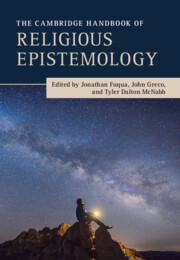Book contents
- The Cambridge Handbook of Religious Epistemology
- Cambridge Handbooks in Philosophy
- The Cambridge Handbook of Religious Epistemology
- Copyright page
- Contents
- Tables
- Contributors
- Introduction
- Part I Faith and Rationality
- 1 Natural Theology and Religious Belief
- 2 Evidence and Religious Belief
- 3 Reformed Epistemology
- 4 Rationality and Miracles
- 5 Pragmatic Arguments for Theism
- 6 Skepticism, Fideism, and Religious Epistemology
- 7 The Problem of Faith and Reason
- Part II Religious Traditions
- Part III New Directions
- References
- Index
5 - Pragmatic Arguments for Theism
from Part I - Faith and Rationality
Published online by Cambridge University Press: 24 August 2023
- The Cambridge Handbook of Religious Epistemology
- Cambridge Handbooks in Philosophy
- The Cambridge Handbook of Religious Epistemology
- Copyright page
- Contents
- Tables
- Contributors
- Introduction
- Part I Faith and Rationality
- 1 Natural Theology and Religious Belief
- 2 Evidence and Religious Belief
- 3 Reformed Epistemology
- 4 Rationality and Miracles
- 5 Pragmatic Arguments for Theism
- 6 Skepticism, Fideism, and Religious Epistemology
- 7 The Problem of Faith and Reason
- Part II Religious Traditions
- Part III New Directions
- References
- Index
Summary
Traditional theistic arguments conclude that God exists. Pragmatic theistic arguments, by contrast, conclude that you ought to believe in God. The two most famous pragmatic theistic arguments are put forth by Blaise Pascal (1662) and William James (1896). Pragmatic arguments for theism can be summarized as follows: believing in God has significant benefits, and these benefits are not available for the unbeliever. Thus, you should believe in, or “wager on,” God. This chapter distinguishes between various kinds of theistic wagers, including finite vs. infinite wagers, premortem vs. postmortem wagers, and doxastic vs. acceptance wagers. Then, it turns to the epistemic–pragmatic distinction and discusses the nuances of James’ argument, and how views like epistemic permissivism and epistemic consequentialism provide unique “hybrid” wagers. Finally, it covers outstanding objections and responses.
Keywords
- Type
- Chapter
- Information
- The Cambridge Handbook of Religious Epistemology , pp. 70 - 82Publisher: Cambridge University PressPrint publication year: 2023
- 1
- Cited by



